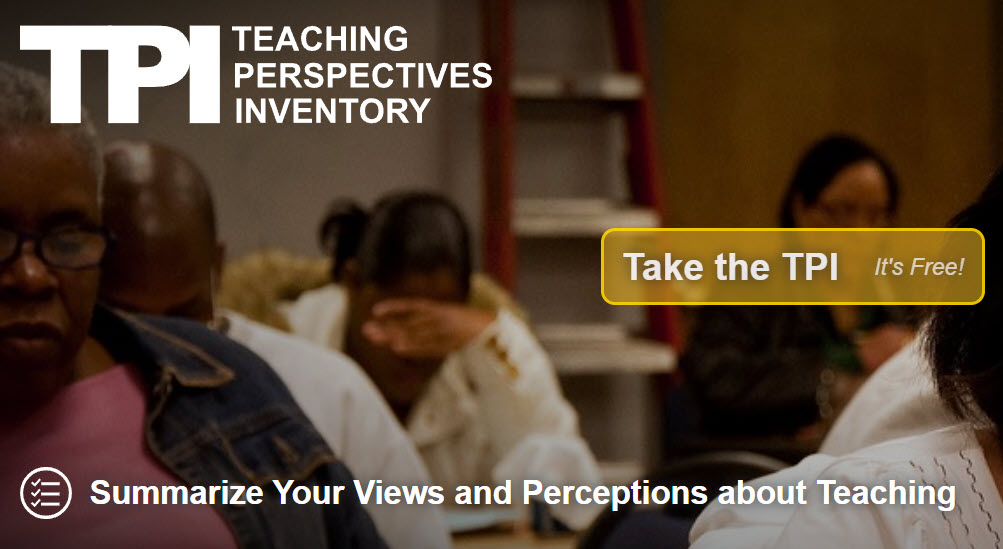Resources
Do you have an idea for a teaching resource? Email us at fac.dev@ubc.ca
Resource Library

Teaching Perspectives Inventory
KEYWORDS: Inventory, Perspectives, teaching, Teaching Perspectives Inventory
CATEGORY: All, All, All, Both, General (e.g. TPI), Learner Group, Learning Context, Other, Patient Involvement, Resource Format, Teacher Role, Topic
The Teaching Perspectives Inventory (TPI) is a free survey that asks teachers to reflect on their teaching beliefs, intentions, and actions. The TPI then generates a report highlighting the teacher’s dominate, moderate, and recessive teaching perspective. The TPI survey has been used internationally for teacher’s individual reflection and for groups of teachers to reflect on their collective teaching perspectives.
View Webpage:
http://www.teachingperspectives.com/tpi/

Flexible Enhanced Learning (FLEX) Orientation
KEYWORDS: FLEX, Flexible Enhanced Learning, Flexible Enhanced Learning (FLEX) Orientation, Orientation
CATEGORY: FLEX/FOS Advisor, Learner Group, Learning Context, Module, Orientation, Patient Involvement, Resource Format, Small-group, Teacher Role, Topic, UGME, Without patient care
This module will introduce UBC Undergraduate Medical Education (UGME) faculty to their role in the Flexible Enhanced Learning (FLEX) course spanning across – MEDD 419, MEDD 429, and MEDD 449.

Foundations of Scholarship (FoS) Orientation
KEYWORDS: FoS, Foundations of Scholarship, Foundations of Scholarship (FoS) Orientation, Orientation
CATEGORY: FLEX/FOS Advisor, Learner Group, Learning Context, Module, Orientation, Patient Involvement, Resource Format, Small-group, Teacher Role, Topic, UGME, Without patient care
This module will introduce UBC’s Undergraduate Medical Education (UGME) faculty to their role in the Foundations of Scholarship (FoS) – MEDD 419 course.

Portfolio Coach Orientation
KEYWORDS: Coach, Orientation, Portfolio
CATEGORY: Learner Group, Learning Context, Module, Orientation, Patient Involvement, Portfolio Coach, Resource Format, Small-group, Teacher Role, Topic, UGME, Without patient care
This module introduces Portfolio Coaches to their role.

Case-Based Learning (CBL) Tutor Training
KEYWORDS: case based, Case-Based Learning, CBL, cbl training, cbl tutor, Training, Tutor, tutor training
CATEGORY: CBL Tutor, Learner Group, Learning Context, Module, Other, Patient Involvement, Resource Format, Small-group, Teacher Role, Topic, UGME, Without patient care
This module outlines Case-Based Learning (CBL) in UBC’s Undergraduate Medical Education (UGME) program, including the roles of the tutor and student, and tutor resources and contacts.

Introduction to Small Group Facilitation
KEYWORDS: Facilitation, Introduction, Introduction to Small Group Facilitation, Small Group
CATEGORY: CBL Tutor, Facilitation/Active learning, Learner Group, Learning Context, Module, Patient Involvement, Resource Format, Small-group, Teacher Role, Topic, UGME, Without patient care
This module describes the importance of small group learning in medical education and the role of small group facilitators in UBC’s Faculty of Medicine. It introduces some strategies for creating a safe learning environment, managing the dynamics of a small group, addresses common facilitation challenges raised in student assessment of teacher data, and includes tips from experienced facilitators.
Inter-City Rounds Facilitation Guide
KEYWORDS: Facilitation, Guide, Inter-City, Inter-City Rounds Facilitation Guide, Rounds
CATEGORY: Facilitation/Active learning, Large-group, Learner Group, Learning Context, Lecturer/Presenter/Facilitator, Lectures & Presentations, Patient Involvement, PDF/Document, PGME, Resource Format, Teacher Role, Topic, Without patient care
Techniques for setting up, moderating and closing a respectful and inclusive discussion.
Download PDF:
Inter-City-Rounds-Facilitation-Guide

Land/Territory Acknowledgment
KEYWORDS: Acknowledgment, land, Land/Territory Acknowledgment, Territory
CATEGORY: All, All, Both, EDI/Indigenous topics, Large-group, Learner Group, Learning Context, Patient Involvement, PowerPoint, Resource Format, Small-group, Teacher Role, Topic
Doing a land/territory acknowledgement helps insert an awareness of indigenous presence and land rights in everyday life. This quick guide describes how to create and deliver a digital land/territory acknowledgement and why it is important to promote awareness. Using this resource will also help ensure that making a land/territory acknowledgement is a genuine and meaningful act.
Download PowerPoint:
Digital-Territorial-Acknowledgement-V6-Final

Virtual Teaching
KEYWORDS: learning, teaching, Virtual, Virtual Teaching
The guide provides simple instructions for presenters, moderators, and participants to prepare for and participate in videoconference sessions.
Download PDF:
VC Session Guide - with technical instructions